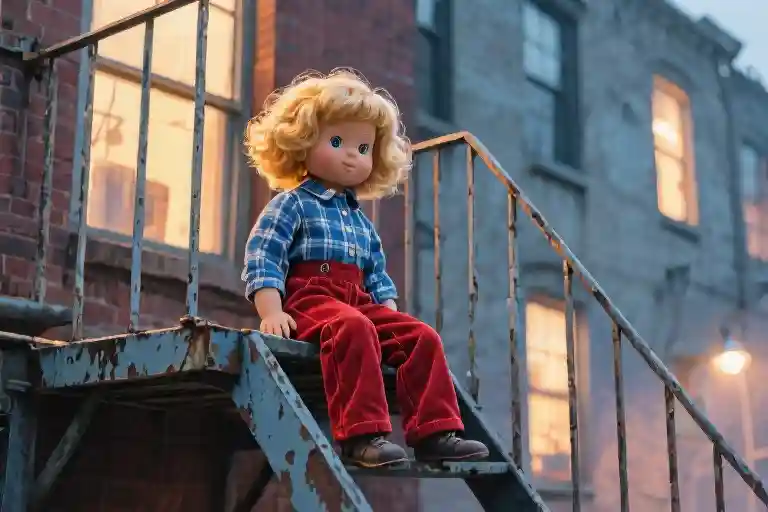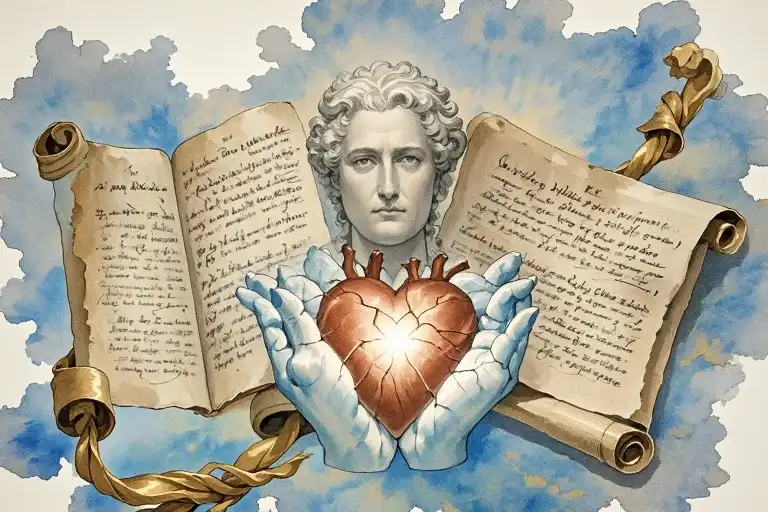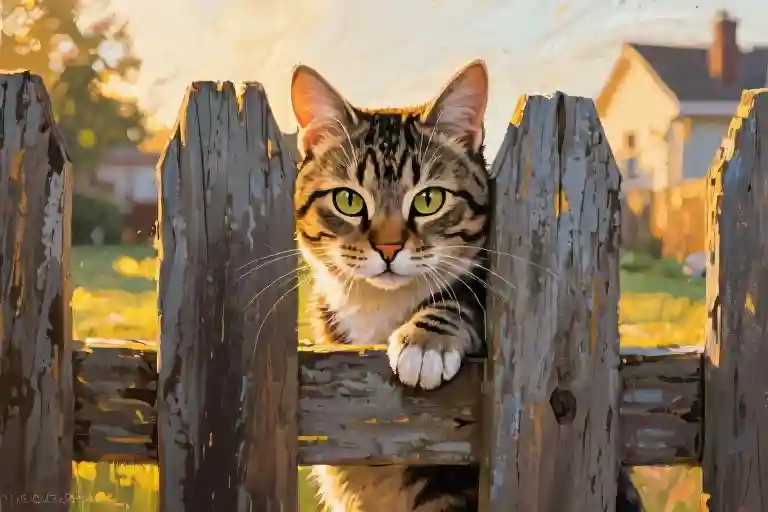Her flaxen curls caught the last light of summer evenings, bouncing against the plaid blue shirt I’d buttoned over her red corduroy pants. Big Michelle’s sullen blue eyes stared back at me from the fire escape, where we perched watching squirrels tear through the brittle leaves. Below us, the city hummed with sirens and shouting neighbors; behind us, my mother’s voice sliced through the screen door, sharp as the fork tines I’d later press against Michelle’s painted lips.
That doll absorbed everything – the sticky heat of August nights, the chemical smell of new library books, the way my stomach growled when we shared buttered potatoes in the dark. I’d prop her against the Sweet Valley High paperbacks, her head lolling slightly as if nodding along to tales of California girls with problems far prettier than ours. When the power got cut, her plastic skin glowed faintly in the moonlight, those glass eyes reflecting the Con Edison notice still magneted to our fridge.
She became real in ways that surprised even me. Her hair collected the scent of my shampoo when I washed it with dish soap. The joints of her limbs developed creaks that mimicked the building’s old pipes. And when I whispered secrets to her on the fire escape, I could almost feel her breath warm against my cheek – though logically I knew it was just the exhaust from the Chinese restaurant downstairs.
What children understand about loneliness isn’t its name, but its weight. Big Michelle carried that weight for me. Her three-foot frame bore the silent hours when no one asked about my day, the shame of eating free lunch at school, the unspoken rule that some questions (‘Why is mom crying again?’) weren’t meant for answering. She was my first lesson in how love often means inventing the thing you need most.
The night her left eye popped out, rolling across the linoleum like a marble, I didn’t cry. Just wrapped her in the sheet we’d used for ghost costumes and tucked her into the closet’s darkest corner. ‘Where’s your baby?’ my mother asked weeks later, her fingers pausing over a pile of hospital bills. I kept writing in my Hello Kitty journal, the one with the lock only I had the key for. ‘Gone,’ I said, pressing so hard the pen left grooves in the paper. Some losses even dolls can’t survive.
This Is Your Baby
She arrived in my life on a Tuesday afternoon, this three-foot-tall creature with pouty pink lips and flaxen curls that smelled faintly of plastic and department store perfume. ‘This is your baby,’ my mother said, thrusting the doll toward me with the same detached efficiency she used when handing me a bag of laundry to fold. The declaration felt both like a gift and a responsibility I hadn’t asked for.
Big Michelle – the name came to me instantly, the ‘big’ necessary to distinguish her from the smaller, less important toys in my room. Her eyes were a sullen blue, like the sky before a storm that never quite broke, framed by lashes so thick they cast shadows on her vinyl cheeks. I dressed her carefully in red corduroy pants and a blue plaid shirt, the colors vibrant against her pale complexion. The outfit felt significant, though I couldn’t have explained why then.
That summer, Big Michelle became my constant companion. We held lengthy conversations on the fire escape, my voice dropping an octave when speaking for her. She had opinions about everything – the squirrels ravaging our building’s lone tree, the boys playing stickball in the alley, even the way I brushed her hair. ‘Not so hard,’ I’d imagine her saying, and my hands would immediately gentle their motions.
In the background of our play, my mother’s voice often rose in sharp bursts, arguing with invisible adversaries about bills or responsibilities or disappointments. Big Michelle and I would pause our tea parties, listening to the muffled shouts through the thin apartment walls. ‘Don’t worry,’ I’d whisper to her, pressing her face against my shoulder. ‘Mommy’s just having one of her days.’
What fascinated me most was how real she became through these small acts of care. When her curls got tangled from being carried everywhere, I painstakingly combed them smooth. When her vinyl hands grew dusty from our fire escape adventures, I wiped them clean with a damp washcloth. The more attention I gave her, the more life she seemed to possess – until some days I could almost believe she breathed when I wasn’t looking.
Our relationship followed its own peculiar logic. I knew she wasn’t alive because her body stayed cool to the touch no matter how long I held her. Yet I also knew she was alive because her eyes followed me around the room, because her curls bounced when I accidentally dropped her, because she never once complained about the buttered potatoes that were sometimes our only dinner.
At night, I’d tuck her beside me in bed, arranging her limbs carefully so she wouldn’t ‘get stiff.’ Once, waking to find her face pressed against mine, I startled at the coldness of her cheek before remembering – this was how it should be. The realization brought an odd comfort. However unpredictable my world might be, Big Michelle would always be exactly what I needed her to be.
Through her, I practiced a kind of motherhood far removed from what I experienced daily – one filled with patience and whispered reassurances and small, consistent acts of love. When my mother forgot to pack my lunch again, I made pretend sandwiches for Big Michelle. When the shouting behind closed doors grew too loud, I covered her ears with my hands, as if protecting her might somehow protect me too.
Buttered Potatoes in the Dark
The Con Edison notice arrived on a Tuesday, though days of the week meant little when you’re eight and summer stretches endlessly before you. I found it wedged under our avocado-green refrigerator magnet, its bold black type declaring our surrender. Big Michelle and I studied it together, her sullen blue eyes level with mine as I traced the words with a grubby finger. The paper smelled like mimeograph ink and someone else’s indifference.
That night, the lights went out with a sigh. Not the dramatic flickering you see in movies, just a quiet giving up. The Sweet Valley High book slipped from my hands as darkness swallowed our apartment whole. Jessica Wakefield’s perfect California life disappeared mid-sentence, her red Fiat vanishing into the black.
‘Don’t be scared,’ I told Michelle, though my voice cracked on the last word. The fire escape moonlight painted stripes across her face, making her look like she was already grieving. We sat cross-legged on the linoleum, our backs against the oven door still warm from dinner. I could hear Mrs. Ruiz next door arguing with her cable bill, the familiar rhythm of her Spanish curses oddly comforting.
The potatoes came from a dented pot I’d dragged onto the floor. Still warm, their skins crisp with the butter we couldn’t really afford. I speared one with my fork, the tines glinting in the weak light from the streetlamp six stories below. ‘Open wide,’ I whispered, pressing the fork against Michelle’s painted lips. The butter left a greasy star on her mouth that wouldn’t wipe off no matter how hard I tried with the hem of my nightgown.
We took turns that night – one bite for me, one pretend bite for her. The salt stung my chapped lips. Michelle’s silence grew heavier with each passing minute, until I filled it by reading aloud about Elizabeth’s trigonometry test and poolside kisses. My voice sounded strange in the dark, thinner somehow, like the last thread holding our ordinary world together.
When the refrigerator kicked back on hours later, its sudden hum startled us both. The bulb inside flickered to life, illuminating the empty potato pot, the fork still clutched in Michelle’s stiff fingers, and the Con Edison notice now curled at the edges from my nervous handling. Somewhere down the hall, a baby began crying. Michelle and I sat very still, watching the shadows rearrange themselves into something almost familiar.
The Baby’s Gone
The first thing to go were her eyes. One morning I found them loose in their sockets, those sullen blue marbles rolling like misplaced beads in the palm of my hand. I tried pressing them back in, my small fingers pushing against the hollow plastic lids, but they kept falling out with a soft clatter onto the linoleum floor. Big Michelle stared up at me through empty holes where her gaze used to be – that stormy blue now reduced to a void.
I wrapped her carefully in my bed sheet, the one with faded daisies along the edges. The fabric swallowed her three-foot frame whole, turning her into a ghost of the companion who’d sat with me through power outages and buttered potato dinners. Her flaxen curls peeked out from the top of the bundle like the last gasp of something alive. The closet smelled of mothballs and forgotten winter coats when I placed her inside, shutting the door on what had been my most faithful listener.
Mother found me writing in my Hello Kitty journal when she asked about the missing doll. The pink pen moved across the pages without pausing, recording secrets more real than any conversation we’d ever had. ‘Where’s your baby?’ she called from the kitchen, the clatter of pans underlining her question. I didn’t look up from the looping letters taking shape beneath my hand. ‘The baby’s dead,’ I said, and the words tasted strangely adult in my mouth. ‘Baby’s gone.’
Later, I would press my ear against the closet door, listening for the rustle of fabric that never came. The silence felt heavier than before, as if the apartment itself noticed the absence of our imagined conversations. In the dark space behind that door, Big Michelle’s red pants and plaid shirt would gather dust alongside my childhood’s quiet casualties – all the things we couldn’t afford to fix, all the broken pieces we learned to live without.
The Baby’s Gone
The eyes came loose first. One morning I found Big Michelle staring up at me with her left eye dangling by a thread of plastic, that sullen blue orb swinging like a pendulum. By afternoon, the right one had fallen into her hollow skull with a small, final click. I shook her gently, listening to the eye rattle inside like a marble in a tin can.
That night I wrapped her in the floral sheet from my bed, the one with the torn corner where I’d chewed it during thunderstorms. The fabric swallowed her whole – the red pants, the plaid shirt, even those golden curls that used to catch the afternoon light on the fire escape. I buried her deep in the closet behind winter coats that smelled of mothballs and old perfume.
‘Where’s your baby?’ my mother asked weeks later, her voice cutting through the steam of boiling potatoes. I kept my eyes on the Hello Kitty journal, pressing my pen so hard the pink cover indented. ‘The baby’s dead,’ I said, and something in the way the words fell between us made her turn back to the stove without another question.
The closet door clicked shut with the same finality as the Con Edison man padlocking our meter box. Somewhere beyond the apartment walls, a siren began its slow wail up Amsterdam Avenue. I counted the floors as it climbed – third, fourth, fifth – before my mother’s hand shook me awake in the dark. Her breath came in short gasps, the words splintering between us: ‘I can’t…’
The hallway light stuttered as we descended six flights, her weight heavy against my shoulder. Each step echoed with the memory of a doll’s plastic eye hitting the floorboards, that small, terrible sound I’d pretended not to hear.






hello!,I like your writing very much! share we communicate more about your post on AOL? I require a specialist on this area to solve my problem. May be that’s you! Looking forward to see you.